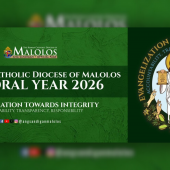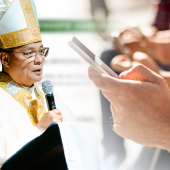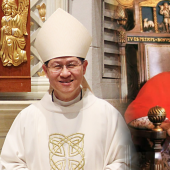Fighting Corruption: Philippine diocese aims to build Structures of Accountability

The Province of Bulacan in the Philippines has been in the headlines these past few months after “ghost” flood control projects were uncovered in the region. With ₱43.5 billion worth of flood control contracts from the Department of Public Works and Highways (DPWH) now under scrutiny due to their substandard or unfinished state, public demand for government transparency and accountability has grown stronger.
Since numerous municipalities in Bulacan are coastal and considered flood-prone, the public reaction to this corrupt practice was unsurprisingly negative. Government officials were called out for fund misuse and their lavish lifestyles. Photos of poorly constructed infrastructure, some of them seemingly abandoned before completion, began circulating online.
Amid the rising tension, Bishop Dennis Villarojo of Malolos, Bulacan, issued a pastoral statement on September 17, in which he called for swift government action and justice, and urged the faithful to actively participate in “building a culture of truth and accountability.”
“We have to come together, the clergy and the laity, not only in rebuilding the broken or impeded infrastructure projects but also in regaining public trust… Holding on to faith, we will emerge from the floods of corruption,” he said.
His call served as the first step toward a powerful Church-led campaign against corruption in Bulacan.
A Spark to Stand Up
Following the release of Bishop Villarojo’s pastoral statement, the first to organize a rally against corruption was the National Shrine of Saint Anne in Hagonoy, one of the most flood-prone areas in Bulacan.
Residents waded through flooded streets on September 20, a day before the “Trillion Peso March” in Manila, wearing black as a sign of mourning for the country’s plight. According to the shrine, representatives from various sectors most affected by constant flooding, particularly fisherfolk, joined the event.
Before heading to the streets, a Holy Mass was offered at the Hagonoy shrine, dubbed “Misa ng Pananagutan” (Mass of Accountability). Fr. Jose Rodel Ponce, the shrine rector, encouraged the youth to lead the charge in the fight against corruption.
“Push the government toward a better path through your modern thinking and wisdom shaped by the modern world,” he said.
A “Flooding” of People
The example of Hagonoy inspired other municipalities to organize their own rallies, all fully supported by their local parishes: Calumpit on September 21, as well as Paombong and Guiguinto on September 14. Public demonstrations increased during the first weekend of October, with Balagtas, Bulakan, and Pulilan organizing rallies on October 4; Bocaue, Marilao, and Baliuag City on October 5; and Meycauayan City on October 12.
Meanwhile, the clergy of San Miguel, in the northern part of Bulacan, released a manifesto calling on the faithful to join a peaceful rally on October 26.
“Corruption, theft, apathy toward the poor, and claiming public funds for one’s own benefit are acts of direct disobedience to the commandment of God,” they stated.
Building a Church with Integrity
After a month of rallies across Bulacan, the Diocese of Malolos took the fight one step further with the release of its three-year pastoral plan, themed “Evangelization Towards Integrity, Transparency, Accountability, and Responsibility.”
From 2026 to 2028, the Catholic Church in Bulacan will focus on building Structures of Accountability in every parish, organization, and Christian home. The faithful are encouraged to establish clear requirements and regulations to foster a culture of transparency, as well as practical systems for improved auditing and evaluation of duties and services.
During the launch of the pastoral plan, Bishop Villarojo urged the faithful to maintain integrity without making baseless judgments or being exclusionary.
“Integrity requires certain standards,” said the bishop. “We must be flexible without compromising the teachings of the Church by tolerating everything. We have to make certain distinctions and help people find their place within the Church.”
He further reminded everyone to treat others as fellow Christians, giving them the opportunity to change and be transformed through the Lord.
Now, with a three-year plan underway, the Diocese of Malolos moves toward a more concrete path of renewal, building a Church rooted in transparency and integrity, with a Synodal approach deeply at the heart of its mission.
(Luke Godoy is a freelance writer based in the Philippines who contributes regularly to RVA.)
Radio Veritas Asia (RVA), a media platform of the Catholic Church, aims to share Christ. RVA started in 1969 as a continental Catholic radio station to serve Asian countries in their respective local language, thus earning the tag “the Voice of Asian Christianity.” Responding to the emerging context, RVA embraced media platforms to connect with the global Asian audience via its 21 language websites and various social media platforms.














